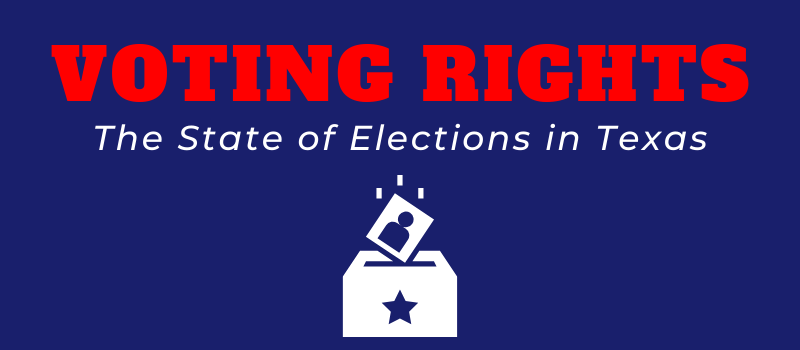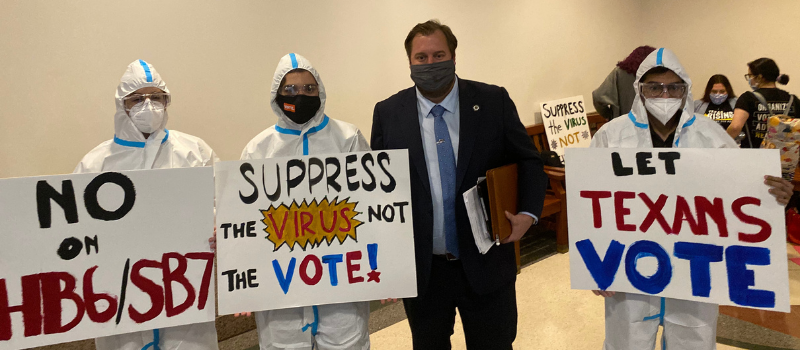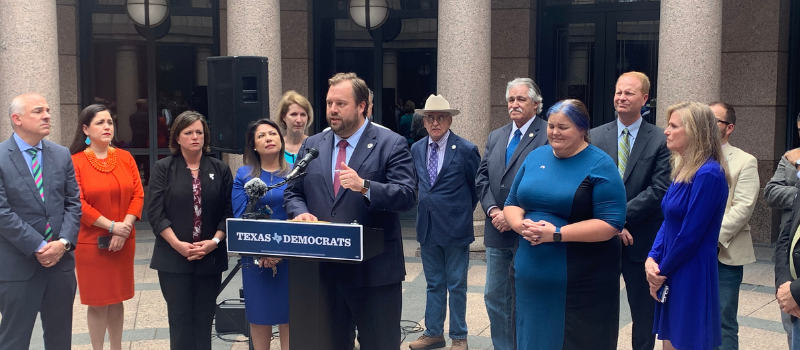|
|
Dear John,
The Texas Legislature has adjourned sine die, meaning without any further date. Over the next few weeks in this multi-part Sine Die edition of the Bucy Bulletin we'll cover big items like the budget, the electric grid, and the state of voting rights, as well as discuss the good, bad, and ugly of the 87th Legislative Session, highlight some of our favorite moments, and provide an update on the status of our legislative agenda. Today's version covers the state of elections in Texas.
I am so grateful for this opportunity to serve you, House District 136, and the people of Texas. Please do not ever hesitate to reach out if you have any questions or comments or if there is anything my office can do for you.
All the best, |
|
|
John H. Bucy III State Representative House District 136 |
|
|
|
THE STATE OF VOTING RIGHTS |
|
At the start of the legislative session, the Secretary of State's Office testified before the House Elections Committee that the 2020 elections in Texas were "a success" and that they were "smooth and secure." Unfortunately, the bills we heard throughout the session and some of what passed do not reflect that reality.
In that same hearing, we heard from the Department of Public Safety about the implementation of the Stringer decision, where a federal judge ordered the state to allow Texans to update their voter registration online simultaneously while updating their driver license information. While limited, this was the first time ever that any form of Online Voter Registration has been available in Texas.
DPS told us that 500,000 Texans used the online tool from the end of September 2020 to February 2021. And when I asked more questions, DPS affirmed the online voter registration was working "well" and "without complication." You can watch that exchange below. |
|
|
Instead of building on the success of the 2020 elections and furthering access to the ballot box, we saw bills that pandered to the Big Lie and conspiracies of voter fraud. As a result, there was an increase in restrictive elections legislation that would have made it harder to register, harder to cast a ballot, and further criminalized the democratic process. In fact, over 65 anti-voter bills were filed in Texas, according to the Voting Rights Lab, more than Georgia, Florida, North Carolina, and Arizona combined.
At the end of the day, many of these bad bills died or we were able to add amendments to reduce their impact, including working with the author to ensure a ban on grant funding for elections in H.B. 2283 didn't apply to federal or state funds or to in-kind donations or rental discounts of polling place locations. Similarly, we saw some positive legislation like Risk Limiting Audits (S.B. 598), uniform training for elections officers (S.B. 231), updates to interpreter qualifications that codify lawsuits and changes in federal law (S.B. 331), changes to the frequency of list maintenance with respect to death certificates (H.B. 1264), and a comprehensive clean-up of outdated and obsolete provisions of the elections code (H.B. 3107).
In a challenging session, I was also proud to have passed several pieces of pro-voter legislation that made it to the Governor's desk. H.B. 1382, which allows voters to track their applications and ballots to vote by mail like they would a package in order to increase accessibility, efficiency, and voter confidence, has already been signed into law by the Governor. We added in provisions from another bill I filed, H.B. 3527, to ensure counties are providing rosters of who has voted to the Secretary of State in a timely manner and thereby ensuring the full functionality of the tracker. Similarly, S.B. 1116, which I sponsored when it came over to the House and amended provisions from H.B. 2860 into to also include notices of election, polling place locations, and other critical information on local jurisdictions' websites in addition to election results, has also been signed into law. |
|
|
|
H.B. 6 and S.B. 7 |
|
Of all the election bills that we were all able to stop, I am most proud that H.B. 6 and S.B. 7, the omnibus voter suppression legislation, died. We started this fight with H.B. 6. We spent hours debating this anti-voter bill in committee and pointing out its flaws and contradictions. We applied consistent pressure, enough to force the bill’s author to cancel a hearing on the bill and stop it in its tracks.
Still, we knew this wouldn’t be the end of the bill. By this time, S.B. 7 had made it over from the Senate, with notable provisions added to it from H.B. 6 in a sudden swap in committee. My colleagues and I were given no warning or time to read what was now S.B. 7. Ignoring our concerns that the people of Texas deserved a proper hearing on the bill, with the ability to examine it and understand its impact on their voting rights, the bill’s sponsor moved S.B. 7 through committee and onto the House floor. Ultimately, in the final hour of the legislative session, we stopped S.B. 7 using every tool at our disposal. But before discussing how we eventually killed this bill, I want to take some time to highlight just how backward S.B. 7 is.
S.B. 7 is one of the most restrictive pieces of election legislation to have moved through the Legislature in many years. If passed, this bill would have added obstacles to voting at nearly every step of the election process. It empowers partisan poll watchers to disrupt elections; bans drive-through and 24-hour voting, methods heavily favored by young people and people of color; and undermines Texans’ abilities to vote by mail, which we have been doing safely and securely in this state for 100 years. It also makes it easier for dubious claims of voter fraud to overturn an election. Under S.B. 7, anyone can overturn an election so long as their claims of voter fraud simply have a “preponderance of evidence,” or are more likely to have happened than not, as opposed to the current standard of “clear and convincing,” or highly and substantially more likely to be true than untrue.
As a member of the Elections Committee, I did everything I could to fight S.B. 7. I also want to thank my committee colleagues -- Vice Chair Jessica González, Rep. Michelle Beckley, and Rep. Art Fierro -- and my fellow House Democrats for standing alongside me in this fight. When S.B. 7 made it onto the floor of the House, we came prepared with amendments meant to clarify the bill’s intentions where possible and points of order meant to derail dangerous provisions of the bill where possible. I also spoke on the House floor on some of the problems with the bill, and how it goes against everything we as Texans stand for. |
|
|
I am also particularly proud to have added an amendment in honor of Crystal Mason, who has faced harsh consequences and penalties for a simple mistake. Specifically, my amendment clarifies existing law to make sure that only people who know they are ineligible to vote can be prosecuted for illegal voting, as the Legislature intended. We should not be throwing people in jail just for making innocent mistakes during the voting process. |
|
|
This session showed that when we stand together, we can take down any bad bill, no matter how draconian. Sometimes, this means taking drastic action. When S.B. 7 came up for a final floor vote on Sunday, May 30th, late at night, we had just been given access to the conference committee report which shows each legislative chamber’s final compromise on the bill. With the end of session looming, there was no time to read or have a real debate, and no time for the public to weigh in. Given this, I joined my colleagues in walking off the House floor to break quorum. This is a constitutionally protected, parliamentary procedure used only in the most dire of circumstances, and it’s not something any of us took lightly. However, the reality of the situation is that S.B. 7 was an appalling deviation from legislative norms that deserved that level of response. On this occasion, we knew we had to make good trouble to protect the people of Texas.
Since the legislative session ended, we have seen several lawmakers walk back various provisions of S.B. 7, saying that they were unintended or simple mistakes such as typos. While they may claim they did not know, my colleagues and I told them about these concerning provisions in detail before they voted in favor of the resolution to go outside of the bounds and add in the sections that had not previously been discussed in either the House or the Senate, including overturning elections. |
|
|
To me, this underscores the importance of legislating in the light of day. Many aspects of S.B. 7 were negotiated behind closed doors, where the people of Texas couldn’t see or hear what was being discussed. Had constituents and stakeholders been able to come and testify during this process, we would have done a better job vetting and understanding the disparate impacts S.B. 7 would have had on communities of color, Texans with disabilities, seniors, and young people, all of whom already face barriers to voting.
We expect to see S.B. 7 and similar measures again in a special session, and we are prepared to continue fighting to ensure every Texan has access to the ballot box. |
|
|
|
FURTHER REFORM NEEDED |
|
In future sessions, whether it be the upcoming special sessions or the next legislative session, I will continue being a champion of pro-voter reforms. We need to make it easier for eligible Texans to register to vote and cast their ballots so that our democracy reflects all of our voices.
As the 2020 election coincided with the COVID-19 pandemic, it became even more necessary to expand on voter registration options and polling place access for all. Currently, online voter registration only benefits those who are updating their driver license information. To date, well over 500,000 Texans have updated their voter registration online thru the Department of Public Safety's portal, which has been reported to be working well and without complication. Though this is a step in the right direction, it is still limited. It's time for Texas to allow all Texans to register to vote online--which is safe, secure, and efficient.
Additionally, I will continue to propose legislation that helps Texans of all backgrounds increase their access to voting, especially Texans with disabilities. This session, we faced legislation that attempted to limit ballot by mail applications, curbside voting, and voter assistance. This increases the burdens and pressures placed upon Texans with disabilities as they try to navigate making their voices heard. Through passing good policy, such as accessible ballot by mail or shoring up curbside voting, I hope all voters receive the accommodations they need to cast their votes privately and securely.
Last, I will continue to push for legislation that allows voters to fix minor, clerical errors relating to their ballot by mail, also known as ballot curing. This process would ensure that voters are able to make their voices heard without technicalities and incidental mistakes causing their ballot by mail to be thrown out without an opportunity to take corrective action. It is my hope that Texas joins the other 18 states that currently allow ballot curing to ensure that all eligible ballots are properly counted. |
|
|
|
Political advertising paid for by John Bucy Campaign, Hon. Heather Jefts, treasurer. |
.png)


.png)

.png)
.png)
.png)
